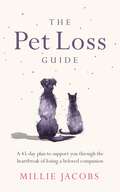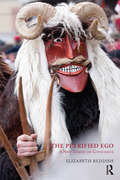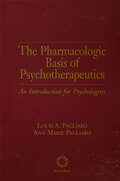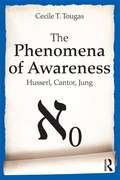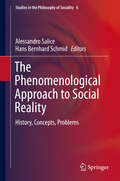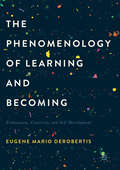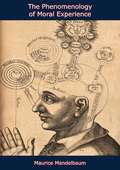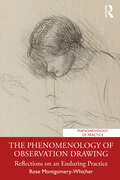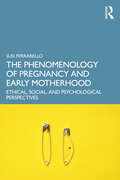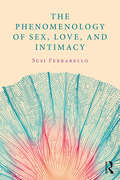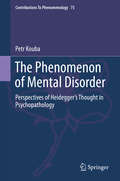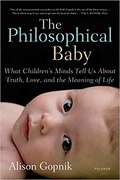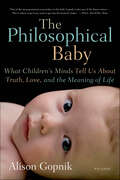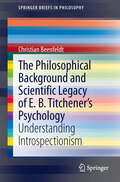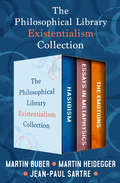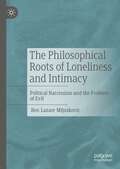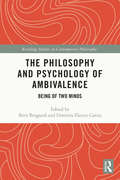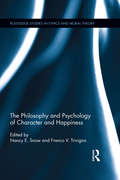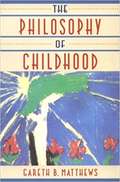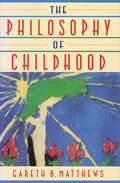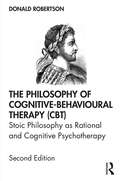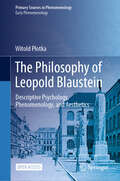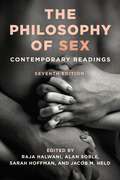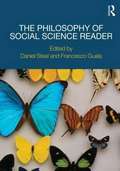- Table View
- List View
The Pet Loss Guide
by Millie JacobsPets are important members of the family and for some they may even be one of the closest relationships they enjoy, so when they die the devastation can be profound. In this long-overdue guide to grieving a beloved pet, Millie Jacobs uses her own personal experience and grief counselling expertise to guide readers through 31 days of exercises and support to help process your loss.Although we are a nation of animal lovers, there is so little emotional support offered to those who are grieving the death of an animal. Millie provides the necessary framework to allow the emotions of this very specific loss to be released and processed.This very practical guide will help every struggling and grieving owner through the loss of a pet and help them to feel they are, at last, allowed to grieve their best friend and companion.
The Pet Loss Guide
by Millie JacobsPets are important members of the family and for some they may even be one of the closest relationships they enjoy, so when they die the devastation can be profound. In this long-overdue guide to grieving a beloved pet, Millie Jacobs uses her own personal experience and grief counselling expertise to guide readers through 31 days of exercises and support to help process your loss.Although we are a nation of animal lovers, there is so little emotional support offered to those who are grieving the death of an animal. Millie provides the necessary framework to allow the emotions of this very specific loss to be released and processed.This very practical guide will help every struggling and grieving owner through the loss of a pet and help them to feel they are, at last, allowed to grieve their best friend and companion.
The Petrified Ego: A New Theory of Conscience
by Elizabeth ReddishDue to the inherent contradiction in Freud's concept of the Superego, there is a gap in our psychoanalytic understanding of how conscience evolves. This distinction is essential for the successful treatment of patients dominated by a harsh Superego and provides valuable insight into how contemporary society evaluates moral decisions. The Petrified Ego argues for a revision of psychoanalytic theory to include instinct as the primary form of morality. It makes the case that our earliest, infantile notion of 'good' and 'bad' is rather founded on experiences which have been 'safe or 'threatening'. More often than not, this is the basis of our moral judgement of others. It is only through direct challenge to these visceral values that beliefs independent of the survival instinct can be forged. Why does this matter? Lack of distinction between the two means that consideration of the 'right or wrong' or the 'good or bad' of others' behaviour is no more than the rationalising of an instinctual response.
The Pharmacologic Basis of Psychotherapeutics: An Introduction For Psychologists
by Louis A. Pagliaro Ann M. PagliaroFirst published in 1998. Routledge is an imprint of Taylor & Francis, an informa company.
The Phenomena of Awareness: Husserl, Cantor, Jung
by Cecile TougasWhat is awareness? How is dreaming different from ordinary awareness? What does mathematics have to do with awareness? Are different kinds of awareness related? “Awareness” is commonly spoken of as “mind, soul, spirit, consciousness, the unconscious, psyche, imagination, self, and other.” The Phenomena of Awareness is a study of awareness as it is directly experienced. From the start, Cecile T. Tougas engages the reader in reflective notice of awareness as it appears from moment to moment in a variety of ways. The book draws us in and asks us to focus on the flow of phenomena in living experience, not as a theoretical construct, nor an image, nor a biochemical product, but instead as phases, moments, or parts that cannot exist without one another. Tougas shows how these parts exist in mutual dependence as a continuum of awareness, as the flow of lived time, and how noticing time deepens psychological self-understanding and understanding of another. The Phenomena of Awareness is divided into four parts: • Seeking and Noticing Awareness• Observing and Understanding the Flow of Phenomena• Distinguishing Intentional Acts• Work in Progress Drawing on the work of E. Husserl, G. Cantor and C.G. Jung, this book is an original synthesis of phenomenology, mathematics and psychology that explores awareness and the concept of ‘transfinite number’. This book will be of interest to analytical psychologists, philosophers, mathematicians, feminist scholars, humanities teachers and students. Cecile T. Tougas teaches Latin at the North Carolina School of Science and Mathematics, Durham. She taught philosophy at the University of Southern Maine and the University of Massachusetts Lowell.
The Phenomenological Approach to Social Reality: History, Concepts, Problems (Studies in the Philosophy of Sociality #6)
by Hans Bernhard Schmid Alessandro SaliceThis volume features fourteen essays that examine the works of key figures within the phenomenological movement in a clear and accessible way. It presents the fertile, groundbreaking, and unique aspects of phenomenological theorizing against the background of contemporary debate about social ontology and collective intentionality.The expert contributors explore the insights of such thinkers as Martin Heidegger, Edmund Husserl, Adolf Reinach, and Max Scheler. Readers will also learn about other sources that, although almost wholly neglected by historians of philosophy, testify to the vitality of the phenomenological tradition. In addition, the contributions highlight the systematic relevance of phenomenological research by pinpointing its position on social ontology and collective intentionality within the history of philosophy.By presenting phenomenological contributions in a scholarly yet accessible way, this volume introduces an interesting and important perspective into contemporary debate insofar as it bridges the gap between the analytical and the continental traditions in social philosophy. The volume provides readers with a deep understanding into such questions as: What does it mean to share experiences with others? What does it mean to share emotions with friends or to share intentions with partners in a joint endeavor? What are groups? What are institutional facts like money, universities, and cocktail parties? What are values and what role do values play in social reality?
The Phenomenology of Learning and Becoming: Enthusiasm, Creativity, and Self-Development
by Eugene Mario DerobertisIn this text, the history of phenomenological research on learning is synthesized and brought forward into the areas of existential learning, the development of enthusiasm about learning (from childhood through adulthood), and paradigmatic creative experience. Original research findings are derived using the Giorgi method of descriptive phenomenological analysis in psychology. The results, structural and eidetic in nature, are then integrated from a holistic developmental viewpoint: that of Existential-Humanistic Self-Development Theory (EHSDT). An evolving developmental partnership between learning and creativity emerges as the proper conceptual frame for considering optimal growth and the relative maturity of situated becoming oneself (i.e., the process of self-cultivation). The resulting perspective is supported by cutting edge trends in neuroscience and related to pedagogy and education.
The Phenomenology of Moral Experience
by Maurice MandelbaumDuring the past few decades most philosophers have approached ethical theory through logical and epistemological analyses. Others have attempted to derive ethical theory from interpretations of psychological or sociological facts. Professor Mandelbaum shows the necessity for grounding any ethical theory upon the phenomenological analysis of moral experience. In analyzing the structure of that experience and the types of judgment to which it gives rise, Professor Mandelbaum takes as his point of departure the claims of three different traditions: British moral philosophy from the eighteenth century through the first third of the present century; the phenomenological movement in Germany; and the naturalistic, psychologically oriented theories of value which on the whole were characteristic of American philosophy in the first half of this century.In six essays the author probes the most significant features of various types of moral experience and describes those features that all possess in common. His conclusions tend to support those who have attacked the utilitarian tradition.“This is an important and valuable book; neither startlingly revolutionary nor disturbingly profound, its merits are of a more modest kind. Professor Mandelbaum discusses some well-worn themes, but he has an eye for the essential and he illuminates some important areas in moral philosophy that have recently been left obscure.”—Philosophy
The Phenomenology of Observation Drawing: Reflections on an Enduring Practice (Phenomenology of Practice)
by Rose Montgomery-WhicherBased on research, and grounded in experience, this book offers a view into the minds and hearts of people who draw. With technology at our fingertips that allows us to record and share what we see within moments, drawing seems a remarkably slow and difficult way to make an image. And yet, drawing from observation continues to be practiced by professional and amateur artists, a situation that invites the question: What does observation drawing mean in the lives of those who practice it? The central chapters of the book explicate the structures of the lived experience of drawing, weaving phenomenological reflections into a narrative about the author drawing her sister on a train. With lively accounts of drawing from hobbyists, art students, contemporary and historical artists, Montgomery-Whicher considers how the act of drawing shapes place, time, the body and relationships with the world and with others. She addresses many facets of drawing, including the connection between drawing and thinking, the range of emotions felt when drawing a person and the experience of digital drawing. Montgomery-Whicher concludes that observation drawing warrants a place in general education as well as in the education of artists. She argues that drawing will continue to thrive because it is a human practice that deepens and enriches our humanity by giving us access to keener perception, greater understanding, empathy and wonder. This book will be of interest to anyone who has ever wondered about the appeal of drawing, including professional and amateur artists, philosophers, and educators.
The Phenomenology of Pregnancy and Early Motherhood: Ethical, Social, and Psychological Perspectives
by Susi FerrarelloThe Phenomenology of Pregnancy and Early Motherhood provides an ethical, social, and psychological investigation of the process of becoming a mother. Through a phenomenological analysis that engages with feminist philosophy, medical ethics, philosophy of care, and phenomenological psychology, Susi Ferrarello unravels the intricacies of this transformative phase of life to shed light on layers of lived experiences that impact the well-being of the woman. This book addresses the complexity of common lived-experiences characterizing this transition; the overarching period from the first to the fourth trimester, issues concerning maternal-fetal bonding, breastfeeding, PDAM, loss of identity and coming back to work. Enriched by case studies from Ferrarello’s philosophical counseling practice, the book provides a compassionate and insightful exploration of the struggles, triumphs, and moments of self-revelation that mothers encounter in their daily lives. By exploring the heart of the maternal experience, this book shows the often-unspoken realities faced by women as they strive to balance their roles as caregivers, partners, and individuals. The book offers a powerful means for everyday reflection on early motherhood and the ethical, as well as practical, dilemmas it raises. This text is an essential resource for graduate students studying phenomenology, ethics, feminist philosophy, moral psychology, as well as therapists and professionals interested in the challenges of pregnancy, motherhood, and women’s mental health.
The Phenomenology of Sex, Love, and Intimacy
by Susi FerrarelloThe Phenomenology of Sex, Love, and Intimacy presents a phenomenological exploration of love as it manifests itself through sexual desires and intimate relationships. Setting up a unique dialogue between psychology and philosophy, Susi Ferrarello offers a perspective through which clinicians can inform their practice on diverse issues of human sexuality. Drawing on Husserl’s phenomenology, Ferrarello’s analysis of love spans a range of disciplines including psychology, theology, biology, epistemology, and axiology, as well as areas related to gender, consent, and political control. Combining Husserlian perspectives on ethics with a focus on lived-experience, this text will deepen therapists’ understanding of love as the subject of interdisciplinary inquiry and enable them to locate questions of sexuality and intimacy within an academic framework. With key theoretical principles included to allow clinicians to think through and clarify their practice, this book will be a valuable tool for sex therapists, marriage and family therapists, and counselors, as well as psychology and philosophy students alike.
The Phenomenon of Mental Disorder
by Petr KoubaThis book provides a critical introduction to Heidegger's impact on psychiatry and psychology, and has a focus on the application of his philosophy to psychiatry. This is a complete revision of Heidegger's existential philosophy in the light of psychopathological phenomena. Readers will find here a philosophical inquiry into the problem of mental disorder, which shows Heidegger's own philosophy in a new light, uncovering both its strengths and its weak points. The author maps not only Heidegger's interaction with psychiatric thought, as depicted in his Zollikon Seminars, but also his influence on Swiss phenomenological psychiatry. The work treats Heidegger in a critical way, taking the phenomenon of mental disorder as a touchstone on which Heidegger's thought is tested. The results of such a critical examination are important, not only for a better understanding of psychopathological phenomena, but also for a new understanding of Heidegger's approach to human existence. This work treats the phenomenon of mental disorder as a philosophical problem that reflects the ontological character of human existence. Heidegger's approach to mental disorder is confronted with the conceptions of Foucault, Deleuze and Guattari in a novel way. The book is more than just an historical overview as it highlights the limits of phenomenological thought in the area of psychiatry and it shows a possible way of moving beyond them. This is a philosophical work with an interdisciplinary range. Scholars of philosophy and those in the growing field of philosophy of psychiatry, as well as those with an interest in Heidegger Studies will be particularly interested in this work.
The Philosophical Baby: What Children's Minds Tell Us About Truth, Love, And The Meaning Of Life
by Alison GopnikIn the last decade there has been a revolution in our understanding of the minds of infants and young children. We used to believe that babies were irrational, and that their thinking and experience were limited. Now Alison Gopnik ― a leading psychologist and philosopher, as well as a mother ― explains the cutting-edge scientific and psychological research that has revealed that babies learn more, create more, care more, and experience more than we could ever have imagined. And there is good reason to believe that babies are actually smarter, more thoughtful, and more conscious than adults. In a lively and accessible tour of the groundbreaking new psychological, neuroscientific, and philosophical developments, Gopnik offers new insight into how babies see the world, and in turn promotes a deeper appreciation for the role of parents in shaping the lives of their children.
The Philosophical Baby: What Children's Minds Tell Us About Truth, Love, and the Meaning of Life
by Alison GopnikFor most of us, having a baby is the most profound, intense, and fascinating experience of our lives. Now scientists and philosophers are starting to appreciate babies, too. The last decade has witnessed a revolution in our understanding of infants and young children. Scientists used to believe that babies were irrational, and that their thinking and experience were limited. Recently, they have discovered that babies learn more, create more, care more, and experience more than we could ever have imagined. And there is good reason to believe that babies are actually smarter, more thoughtful, and even more conscious than adults. This new science holds answers to some of the deepest and oldest questions about what it means to be human. A new baby's captivated gaze at her mother's face lays the foundations for love and morality. A toddler's unstoppable explorations of his playpen hold the key to scientific discovery. A three-year-old's wild make-believe explains how we can imagine the future, write novels, and invent new technologies. Alison Gopnik - a leading psychologist and philosopher, as well as a mother - explains the groundbreaking new psychological, neuroscientific, and philosophical developments in our understanding of very young children, transforming our understanding of how babies see the world, and in turn promoting a deeper appreciation for the role of parents.
The Philosophical Background and Scientific Legacy of E. B. Titchener's Psychology
by Christian BeenfeldtThis volume offers a new understanding of Titchener's influential system of psychology popularly known as introspectionism, structuralism and as classical introspective psychology. Adopting a new perspective on introspectionism and seeking to assess the reasons behind its famous implosion, this book reopens and rewrites the chapter in the history of early scientific psychology pertaining to the nature of E. B. Titchener's psychological system. Arguing against the view that Titchener's system was undone by an overreliance on introspection, the author explains how this idea was first introduced by the early behaviorists in order to advance their own theoretical agenda. Instead, the author argues that the major philosophical flaw of introspectionism was its utter reliance on key theoretical assumptions inherited from the intellectual tradition of British associationism--assumptions that were upheld in defiance of introspection, not because of introspection. The book is divided into three parts. In Part I, British associationism is examined thoroughly. The author here discusses the psychology of influential empiricist philosophers such as Thomas Hobbes, John Locke, David Hume, David Hartley, James Mill, and John Stuart Mill. In Part II of the book, Titchener's introspectionist system of psychology is examined and analyzed. In Part III, the author argues that Titchener's psychology should be understood as a form of associationism and explains how analysis, not introspection, was central to introspectionism.
The Philosophical Library Existentialism Collection: Hasidism, Essays in Metaphysics, and The Emotions
by Martin Heidegger Martin Buber Jean-Paul SartreExplore the work of three great existential philosophers together in this collection. Hasidism: Zionist philosopher Martin Buber shares the results of forty years of study and introduces the philosophies of Hasidism to a Western audience. In this modern masterpiece, Buber interprets the ideas and motives that underlie the great Jewish religious movement of Hasidism and its creator, Baal Shem. Essays in Metaphysics: German philosopher Martin Heidegger presents two lectures in which he explores the nature of identity in the history of metaphysics. He offers illuminating insights on vital issues like technology, religion, language, history, and more. The Emotions: French philosopher Jean-Paul Sartre attempts to understand the role emotions play in the human psyche. Sartre analyzes fear, lust, anguish, and melancholy while asserting that human beings begin to develop emotional capabilities from a very early age, which helps them identify and understand the emotions&’ names and qualities later in life.
The Philosophical Roots of Loneliness and Intimacy: Political Narcissism and the Problem of Evil
by Ben Lazare MijuskovicBen Lazare Mijuskovic has spent 40 years researching theories of consciousness in relation to human loneliness, using an interdisciplinary and "history of ideas" approach. In this book, Mijuskovic combines Kant's theory of reflexive self-consciousness with Husserl's transcendent principle of intentionality to describe the distinctive philosophical, psychological, and sociological roots of loneliness and intimacy. He argues that loneliness is innate, unavoidable, and constituted by the structure of self-consciousness itself.
The Philosophy and Psychology of Ambivalence: Being of Two Minds (Routledge Studies in Contemporary Philosophy)
by Berit Brogaard Dimitria Electra GatziaThis book collects original essays by top scholars that address questions about the nature, origins, and effects of ambivalence. While the nature of agency has received an enormous amount of attention, relatively little has been written about ambivalence or how it relates to topics such as agency, rationality, justification, knowledge, autonomy, self-governance, well-being, social cognition, and various other topics. Ambivalence presents unique questions related to many major philosophical debates. For example, it relates to debates about virtues, rationality, and decision-making, agency or authenticity, emotions, and social or political metacognition. It is also relevant to a variety of larger debates in philosophy and psychology, including nature vs. nature, objectivity vs. subjectivity, or nomothetic vs. idiographic. The essays in this book offer novel and wide-ranging perspectives on this emerging philosophical topic. They will be of interest to researchers and advanced students working in ethics, epistemology, philosophy of mind, philosophy of psychology, and social cognition.
The Philosophy and Psychology of Character and Happiness (Routledge Studies in Ethics and Moral Theory)
by Nancy E. Snow Franco V. TrivignoSince ancient times, character, virtue, and happiness have been central to thinking about how to live well. Yet until recently, philosophers have thought about these topics in an empirical vacuum. Taking up the general challenge of situationism – that philosophers should pay attention to empirical psychology – this interdisciplinary volume presents new essays from empirically informed perspectives by philosophers and psychologists on western as well as eastern conceptions of character, virtue, and happiness, and related issues such as personality, emotion and cognition, attitudes and automaticity. Researchers at the top of their fields offer exciting work that expands the horizons of empirically informed research on topics central to virtue ethics.
The Philosophy of Childhood
by Gareth B. MatthewsSo many questions, such an imagination, endless speculation: the child seems to be a natural philosopher--until the ripe old age of eight or nine, when the spirit of inquiry mysteriously fades. What happened? Was it something we did--or didn't do? Was the child truly the philosophical being he once seemed? Gareth Matthews takes up these concerns in The Philosophy of Childhood, a searching account of children's philosophical potential and of childhood as an area of philosophical inquiry. Seeking a philosophy that represents the range and depth of children's inquisitive minds, Matthews explores both how children think and how we, as adults, think about them.
The Philosophy of Childhood
by Gareth MatthewsSo many questions, such an imagination, endless speculation: the child seems to be a natural philosopher--until the ripe old age of eight or nine, when the spirit of inquiry mysteriously fades. What happened? Was it something we did--or didn't do? Was the child truly the philosophical being he once seemed? Gareth Matthews takes up these concerns in The Philosophy of Childhood, a searching account of children's philosophical potential and of childhood as an area of philosophical inquiry. Seeking a philosophy that represents the range and depth of children's inquisitive minds, Matthews explores both how children think and how we, as adults, think about them. Adult preconceptions about the mental life of children tend to discourage a child's philosophical bent, Matthews suggests, and he probes the sources of these limiting assumptions: restrictive notions of maturation and conceptual development; possible lapses in episodic memory; the experience of identity and growth as "successive selves," which separate us from our own childhoods. By exposing the underpinnings of our adult views of childhood, Matthews, a philosopher and longtime advocate of children's rights, clears the way for recognizing the philosophy of childhood as a legitimate field of inquiry. He then conducts us through various influential models for understanding what it is to be a child, from the theory that individual development recapitulates the development of the human species to accounts of moral and cognitive development, including Piaget's revolutionary model. The metaphysics of playdough, the authenticity of children's art, the effects of divorce and intimations of mortality on a child--all have a place in Matthews's rich discussion of the philosophical nature of childhood. His book will prompt us to reconsider the distinctions we make about development and the competencies of mind, and what we lose by denying childhood its full philosophical breadth.
The Philosophy of Cognitive-Behavioural Therapy (CBT): Stoic Philosophy as Rational and Cognitive Psychotherapy
by Donald RobertsonThis exciting new edition of The Philosophy of Cognitive-Behavioural Therapy (CBT) demonstrates how techniques and concepts from Socratic philosophy, especially Stoicism, can be integrated into the practise of CBT and other forms of psychotherapy. What can we learn about psychological therapy from ancient philosophers? Psychotherapy and philosophy were not always separate disciplines. Here, Donald Robertson explores the relationship between ancient Greek philosophy and modern cognitive-behavioural psychotherapy. The founders of CBT described Stoicism as providing the "philosophical origins" of their approach and many parallels can be found between Stoicism and CBT, in terms of both theory and practise. Starting with hypnotism and early twentieth century rational psychotherapy and continuing through early behaviour therapy, rational-emotive behaviour therapy (REBT), and cognitive-behavioural therapy (CBT), the links between Stoic philosophy and modern psychotherapy are identified and explained. This book is the first detailed account of the influence of Stoic philosophy upon modern psychotherapy. It provides a fascinating insight into the revival of interest in ancient Western philosophy as a guide to modern living. It includes many concepts and techniques, which can be readily applied in modern psychotherapy or self-help. This new edition, covering the growth in third-wave CBT, including mindfulness and acceptance-based therapies, will appeal to any mental health practitioner working in this area, as well as students and scholars of these fields.
The Philosophy of Leopold Blaustein: Descriptive Psychology, Phenomenology, and Aesthetics (Primary Sources in Phenomenology)
by Witold PłotkaThis is an open-access book which is devoted to rediscovering the early history of phenomenology in confrontation with the legacy of Franz Brentano by discussing Leopold Blaustein’s philosophy. It offers a unique perspective on the history of the phenomenological movement by presenting the development of Blaustein’s theory. Blaustein was a philosopher educated by Kazimierz Twardowski in Lvov, but he also held research stays in Freiburg im Breisgau (where he studied under Edmund Husserl) and in Berlin (where he met Carl Stumpf). Blaustein’s work is usually classified as phenomenology yet some scholars question this by claiming that Blaustein was radically critical of Husserl’s phenomenology. This text addresses these divergent opinions by claiming that Blaustein was both a descriptive psychologist and a phenomenologist. Moreover, the book shows that these two motives were intertwined in Blaustein’s writings and require a reference to other traditions such as the Gestalt theory of Stumpf, and the humanistic psychology of Dilthey. This volume examines sources, context, and applications of the methods used by Blaustein in his original philosophy. It appeals to philosophers, especially phenomenologists, epistemologies, and historians. The more specialized chapters are also relevant to historians of the phenomenological movement and the Brentanian tradition.
The Philosophy of Sex: Contemporary Readings
by Alan Soble Raja Halwani Sarah Hoffman Jacob HeldThe seventh edition of The Philosophy of Sex has quite a few changes. First, it has nine new essays specifically written for this volume: Talia Mae Bettcher's "Trans 101" and Burkay Ozturk's "The Negotiative Theory of Gender Identity and the Limits of First-Person Authority" deal with transgender issues, the former going over some basics and the latter questioning the view that a person has a non-defeasible epistemic and ethical decision regarding what their gender is. The seventh edition has three essays that are new to the volume, though they have been published elsewhere before and also has three revised essays from the sixth one.
The Philosophy of Social Science Reader
by Francesco Guala Daniel SteelThe Philosophy of Social Science Reader is an outstanding, comprehensive and up-to-date collection of key readings in the philosophy of social science, covering the essential issues, problems and debates in this important interdisciplinary area. Each section is carefully introduced by the editors, and the readings placed in context. The anthology is organized into seven clear parts: Values and Social Science Causal Inference and Explanation Interpretation Rationality and Choice Individualism Norms Cultural Evolution. Featuring the work of influential philosophers and social scientists such as Ernest Nagel, Ian Hacking, John Searle, Clifford Geertz, Daniel Kahneman, Steven Lukes and Richard Dawkins, The Philosophy of Social Science Reader is the ideal text for philosophy of social science courses, and for students in related disciplines interested in the differences between the social and natural sciences.
